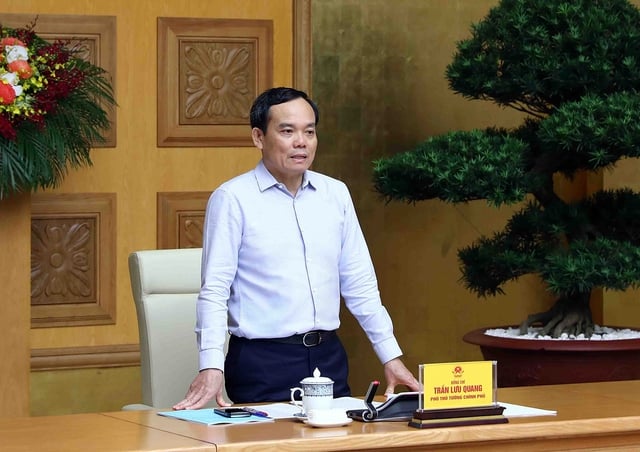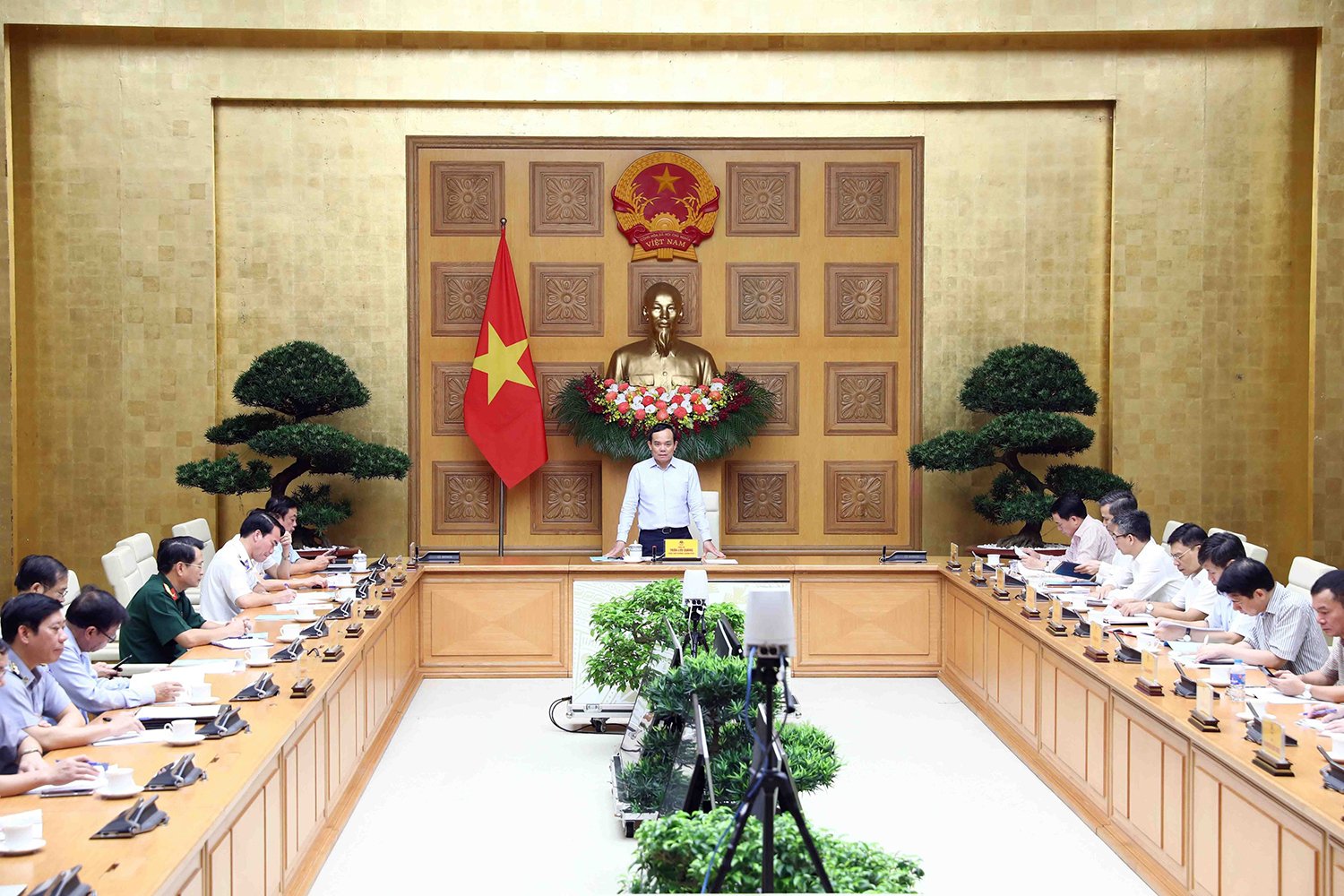June 17, 2025 | 19:51 GMT +7
June 17, 2025 | 19:51 GMT +7
Hotline: 0913.378.918
June 17, 2025 | 19:51 GMT +7
Hotline: 0913.378.918
The conference was held with just over a month left until the European Commission (EC) delegation's fourth visit to Vietnam to inspect and examine the efforts to combat illegal, unreported and unregulated (IUU) fishing in the country.

Deputy Prime Minister Tran Luu Quang straightforwardly emphasized that the EC's "yellow card" warning seriously tarnished Vietnam's reputation.
During the recent period, Vietnam has focused on implementing the EC's four sets of recommendations to combat IUU fishing and remove the "yellow card" warning. These recommendations include: improving the legal framework; monitoring, inspecting, and controlling fishing vessel activities and fleet management; certifying production and tracing the origin of exploited aquatic products; and enforcing the law. Notable progress has been made, yet many persistent issues and limitations remain to be addressed.
The "yellow card" warning not only increases the time, effort, and costs of managing the documentation when exporting aquatic products to the EU but also undermines Vietnam's credibility.
According to estimates by the Vietnam Association of Seafood Exporters and Producers (VASEP), if slapped with a "red card," Vietnam could face a ban on exporting exploited seafood to the EU, amounting to a total value of nearly $500 million USD annually.
Beyond losing market share, a "red card" penalty would also affect the livelihoods of workers in the 60 factories engaged in exporting to the EU, as well as legitimate fishermen. It would also impact the nation's efforts in building a modern fishing industry.
The consequences also extend to the nation's broader economic ambitions. Vietnam has been striving to modernize its fishing industry, focusing on improving fishing practices, enhancing product quality, and complying with international standards. A "red card" penalty would severely hinder these efforts, as it would not only tarnish Vietnam's reputation as a responsible fishing nation but also discourage potential investments and partnerships in the sector. This setback would impede the nation's progress towards sustainable economic growth and diversification.
Moreover, the penalty would also have diplomatic implications, potentially affecting trade negotiations and relationships with other countries beyond the EU. The "yellow card" warning itself has already raised concerns about the country's commitment to combating illegal fishing practices, and an escalation to a "red card" would likely magnify these concerns and hinder collaborative efforts with other nations to address IUU fishing on a global scale.
Apart from the EU, countries like the US have also introduced similar regulations against IUU. If Vietnam receives a "red card," these countries could apply similar measures to Vietnamese seafood exports.
To remove the "yellow card," leaders of various ministries, sectors, and localities believe that closer coordination among functional forces and localities is necessary to better manage and prevent illegal fishing in foreign waters.
This requires strengthening information dissemination, penalties for violations, and thorough investigations into and strict handling of unauthorized individuals and organizations, including legitimizing their operations, and aiding, and abetting IUU activities.
The leadership of the Vietnam Fisheries Surveillance Department proposed that businesses, as members of VASEP, continue to collaborate with the government in implementing IUU regulations, refraining from purchasing, processing, or exporting seafood products that come from sources violating IUU rules.

Deputy Prime Minister assigned the Ministry of Agriculture and Rural Development to formulate a plan that clearly outlines the tasks to be focused on from now until the EC inspection team arrives for work; to prepare thoroughly to receive the EC inspection team and achieve the best results, removing the EC's "yellow card" warning.
In his concluding remarks at the conference, Deputy Prime Minister Tran Luu Quang candidly emphasized that the EC's "yellow card" warning has significantly diminished Vietnam's reputation and also highlighted that the seafood industry could face similar risks of "yellow card" warnings in markets beyond the EU.
The Deputy Prime Minister instructed the Ministry of Agriculture and Rural Development to construct a plan that clearly specifies the tasks to be concentrated on from now until the EC inspection team arrives for work; to be well-prepared to receive the EC inspection team and achieve the best results, promptly removing the EC's "yellow card" warning.
The Ministry of National Defense directed functional forces to enhance patrols and controls, with the goal of preventing any fishing vessels from being apprehended in foreign waters.
The Ministry of Public Security urgently reinforced documentation and initiated prosecution in cases involving intermediaries and linkages that facilitated Vietnamese fishing vessels and fishermen engaging in unauthorized fishing in foreign waters.
Regarding localities, the Deputy Prime Minister assessed that the determination to address the issue has been unevenly distributed. Some localities effectively manage the entry and exit of fishing vessels, and have improved the rate of tracing the origin of exploited seafood, such as Ca Mau. However, there are also localities that have not been resolute in dealing with the recommendations of the EC inspection team.
Translated by Nguyen Hai Long

(VAN) The UNESCO Global Geopark revalidation of Non nuoc Cao Bang and the transition to a two-tier administrative model are presently undergoing a pivotal moment in Cao Bang, the northernmost province of Vietnam.
/2025/06/13/5330-2-004539_953.jpg)
(VAN) Changing policy mindset and removing investment barriers are urgent requirements to open up new development space for enterprises in the agricultural sector.

(VAN) The areas include the restoration of five million hectares of marine ecosystems.

(VAN) Dr. Le Van Nguyen, Director of the Institute of E-Commerce Management (ECM), emphasizes the potential for green development through the cultivation of fruit trees, particularly in provinces such as Son La.

(VAN) VAAS and numerous Vietnamese enterprises have signed cooperation agreements with Japanese partners to promote agricultural technology and trade connectivity.
/2025/05/29/5625-12-214801_567.jpg)
(VAN) Provincial mergers in the Mekong Delta promise to streamline administration, expand inter-provincial raw material areas, and foster close linkages in agricultural value chains, benefiting both businesses and cooperatives.

(VAN) Merging Mekong Delta provinces contributes to the expansion of agricultural raw material areas, addressing previous constraints caused by provincial boundaries. Additionally, this expansion will reduce costs and strengthen linkages between businesses, cooperatives, and farmers.